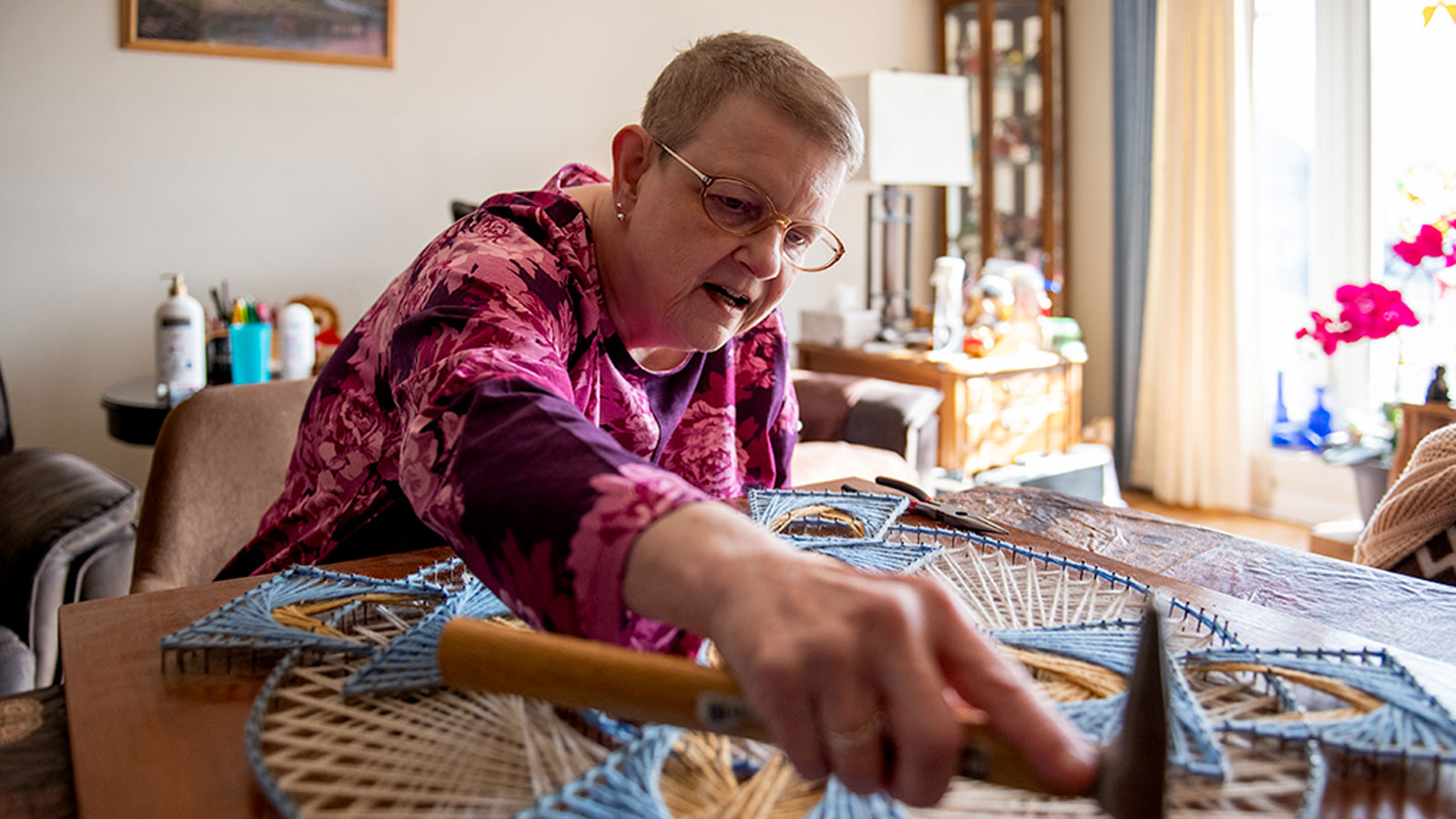Mood Swings vs. Mood Disorders: Know the Signs and Get Help
Are emotional ups and downs disrupting your daily life? Discover common symptoms of mood disorders and learn when to talk to a doctor about diagnosis and treatment options.

By Tyler Veterano, DO, Psychiatrist and Medical Director of Interventional Psychiatry – Virtua Behavioral Health
It’s human to experience a range of emotions and feelings connected to everyday events. You’ve probably felt excited or happy because of a positive life event, like a job promotion, a significant achievement, or a new relationship. You’ve likely also experienced sadness or feeling “down” after a negative life event, like the end of a relationship, financial hardship, or the death of a loved one.
However, if you experience emotional changes that disrupt your daily activities for more than a few days, it could be a sign of a mood disorder.
What are the symptoms of a mood disorder?
Mood disorders like depression or bipolar disorder have a range of symptoms, including:
- Variations in sleep, appetite, motivation, focus, and energy levels
- Emotional highs and lows
- Lack of interest in hobbies, work, and relationships
- Feeling sad or anxious
- Feeling guilty or worthless
- Thoughts of suicide
When to seek care for a mood disorder
If you're experiencing symptoms of a mood disorder, it’s important to discuss it as soon as you can with your primary care provider (PCP), who can ensure you receive a proper diagnosis and treatment.
Your care will start with a physical exam, lab work to rule out other possible causes, and a review of your medical history, including past mental health issues. Your provider will review your symptoms and may ask questions about their frequency, intensity, or possible causes.
Based on your symptoms, your PCP may prescribe a medication that addresses your specific symptoms. They may also refer you to a psychologist or social worker for counseling, where you can talk about your feelings and learn coping techniques. If your symptoms don't improve with treatment, you may be referred to a psychiatrist who can provide more complex care.
While mood disorders are common, they're very treatable–especially when diagnosed early.
Virtua's mental health team is here to help
Virtua offers a range of mental and behavioral health services to help you get a proper diagnosis and treatment. We want to connect you to the care and services you need so you can feel better in your everyday life.
This includes outpatient mental health treatment with licensed clinical social workers for Virtua Primary Care patients. To help meet patients' mental and emotional health needs, our primary care physicians refer their patients to licensed clinical social workers (LCSWs) who work within the practice. These professionals provide a range of psychotherapy services, including cognitive behavioral therapy, and treat conditions including anxiety, depression, eating disorders, mood disorders, and substance abuse.
Schedule a primary care appointment online now or call 888-847-8823.
There's So Much More to Explore
Discover expert insights, inspiring stories, health tips, and more by exploring the content below!

At-Home Colon Cancer Tests vs. Colonoscopy: Which Screening Option Is Right for You?

How Exercise Helps Fight the Winter Blues and Improve Your Mood

8 Signs It's Time to See a Gastroenterologist

How the Unique Stages of a Woman's Heart Affect Her Health

How Weight-Loss Surgery Can Improve Diabetes, Heart Health, and More

How to Achieve Your Health Goals This Year

Knee Replacement Rehab: 7 Exercises to Restore Your Strength and Range of Motion

COPD vs. Asthma: Understanding the Difference in Symptoms

Caregiving During the Holidays: Ways to Manage Stress and Find Joy

Do Weighted Blankets Actually Work?

Bioidentical Hormone Replacement Therapy Pellets: Relief for Menopause and Andropause Symptoms

Why Is Sex Painful During Pregnancy? Pelvic Congestion Syndrome Explained

Don't Drink Alcohol? You Could Still Get Fatty Liver Disease

What Is the Difference Between Palliative Care and Hospice Care?

How to Exercise Safely with Asthma: Tips, Triggers, and Rescue Inhaler Use

How to Relieve Bloating Fast: Simple Tips for Quick Comfort

How to Tell the Difference Between Cold, Flu, and COVID-19

Jill Travels From Delaware to South Jersey for Advanced Lung Care

4 Exercise Tips to Help You Reverse High Blood Pressure

From Exhaustion to Empowerment: Tracy's Hormone Replacement Therapy Success Story

Why on Earth Am I Always So Cold?

Daily Wellness Checklist: Simple Habits for Feeling Good Inside and Out

Timely Heart Care During a Heart Attack Helps Joe Feed the Community

Allegra Is Thriving With Crohn's Disease

The Best and Worst Foods for Acid Reflux

How to Manage IBS Symptoms and Feel in Control Again

5 Types of Lung Disease: Symptoms, Causes, and Prevention Tips

Foods to Enjoy and Avoid for GLP-1 Heartburn

3 Reasons Why Now's the Time to Find Relief From Varicose Veins

Baseball Coach Turns Male Breast Cancer Surprise into Personal Mission

The Brain Health Checklist: 11 Questions Everyone Should Ask

From Caregiver to Patient: Robotic Surgery Relieves Teresa's Knee Pain

How to Get and Stay Healthy This Fall

How to Reverse Prediabetes and Prevent Type 2 Diabetes

Social Tips for Introverts: Finding Connection While Preserving Your Energy

Young Breast-Cancer Survivor Has New Hope for Healthy Future

Is Cancer Hereditary? What You Need to Know About Your Genetic Risks

Tara's Story: From Debilitating Uterine Fibroid Pain to a Half-Marathon Medal

Is Your Post-Pregnancy Belly Bulge a Sign of Diastasis Recti?

Where To Seek Mental Health Help And Treatment

IBS and Alcohol: Can You Still Enjoy a Drink?

Focus on Mental Health Is Key Part of Andrew's Weight-Loss Journey

What You Need to Know About Epilepsy

'Feeling Joy Again': ECT Brain Stimulation Therapy Restores Ashley's Well-Being

Not Just for Wrinkles: Botox Injections Promote Improved Bladder Control

How to Stay Cool and Prevent Heat Illness All Summer Long

Do Not Get Burned by These Sunscreen Myths

Beat the Bugs and Save Your Summer

What Happens to Your Body When You Don't Get Enough Sleep?

Why You Get Sick on Vacation (and How to Stay Healthy While Traveling)

6 Hot Tips for a Safer Summer

4 Surprising Health Truths You Should Know

5 Feel-Good Activities to Explore Around South Jersey

Tips to Support Your Childs Mental Health

5 Key Facts About Proton Therapy for Cancer Treatment

Mood Swings vs. Mood Disorders: Know the Signs and Get Help
Are emotional ups and downs disrupting daily life? Learn common signs of mood disorders, and when to talk to a doctor about diagnosis and treatment options.

Take Pride in our Health: Must Dos for LGBTQ+ Preventative Care

4 Foolproof Pelvic Floor Strengthening Exercises for Women

What to Expect During Perimenopause

Protect Yourself From Tick Bites and Lyme Disease

10 Quick Ways to De-Stress

4 Ways to Stay Fit and Healthy on a Budget

6 Tips to Tame Your Spring Allergies

Do You Know the Signs and Symptoms of Uterine Fibroids?

How Are Uterine Fibroids Treated?

From Restless to Restful: How Movement Improves Sleep

5 Simple Ways to Spring Clean Your Wellness Routine

How Do You Manage the Side Effects of Weight-Loss Medications?

A Woman’s Four-Step Guide to Fight Back on Back Pain

What You Need To Know About Carpal Tunnel Syndrome

The Truth About Menopause, Weight Gain, and Belly Fat

Shedding Light on Lesser-Known Menopause Symptoms and Solutions

Debunking The Myths About Vaginal Dryness
Inside Look at Blood Vessels Aids PAD Treatment
Denise Davis: Pay Attention to Your Heart Health

What You Need To Know About Stroke Treatment

10 Smart Ways to Manage Your Diabetes

Signs You May Have Chronic Kidney Disease

5 Essential Winter Foot Care Tips When You Have Diabetes

Sweet Music: Trust, Teamwork Save Justin from Heart Attack

Complex Heart Surgery Nets James a Lifelong Friend

Hepatitis C Kidney Transplant a Blessing For Lee Manns

7 Reasons Why You Want Your Surgeon to Be an Expert in Robotics

Colitis Symptoms Under Control, Jennifer Is ‘Living My Best Life’

How Do I Care for a Wound that Won't Heal?

Five Back Pain Risk Factors That You Should Know

Is My Back Pain Normal, or Is It Spinal Stenosis?

Augmented-Reality Surgery Has Bobby Back on Stage, Rocking His New Hip

Robotic Hernia Surgery Combines Innovative Techniques With Faster Recovery Times

How Does Breast Density Affect Your Mammogram?

Menopause: New Insights Into the Power of Hormone Replacement Therapy

Signs You Should Get Treated For Vein Problems

One New Heart Valve Saves Two Lives in the Tritten Family

What You Need to Know About Heart Failure
Lung Valve Surgery Relieves COPD, Emphysema Symptoms

Lung Screening, Robotic Technologies Get Pat Kicking Up Her Boots Again

Breast Cancer Diagnosis Inspires Catherine to Help Others

Jasmine’s On-Air and Pain-Free After Gallbladder Surgery

When Should I See a Doctor About My Knee Pain?

Quick Action Leads to Jesse's Recovery From Stroke

A Non-Athlete’s Guide to Shoulder Overuse Injuries
Shoulder problems aren’t limited to athletes. Virtua orthopedic surgeon Sean McMillan, DO, explains shoulder overuse injuries and prevention in this article.

Put Lower Back Pain Behind You With This Ten-Step Guide

Wide-Awake Hand Surgery Speeds Recovery, Puts Control in Patients' Hands

South Jersey Veteran Thrives After Cross-Country Kidney Donation

Five Mindfulness Tips That Can Help Heal Your Heart

3 Ways to Avoid Knee Pain

When Should I See a Doctor for My Hip Pain?

When Should I See a Doctor About My Shoulder Pain?

Is My Back Pain Normal, or Is It Sciatica?

Is My Back Pain Normal, or Is It a Herniated Disk?

When Is It Back Pain, and When Is It Something More?

Watchman Heart Device: a Technological Breakthrough for Blood Clot Prevention

Albert's Emergency Cardiac Surgery Is a 'Story of a Lifetime'

What Can I Do Right Now About My Aching Back?

How Do I Get Rid of This Back Pain for Good?

Can Your Gut Health Affect Your Heart?

When Should I Be Worried About My Neck Pain?
Advanced Heart Failure Therapies Get Bernadine Back to Full Speed

Sarah Wins Back Her Health After Crohn's Disease Diagnosis

Overcoming Addiction, Philip Now Sees More Positive Side to Life
Firefighter's Successful Lung Cancer Care at Virtua
A Lung Screening Put Teresa Back in the Race

A Breast Self-Exam Saved Kristen's Life

Protect Your Child From HPV and Related Cancers

4 Not-So-Crazy Questions to Ask Your Doctor

Early Treatment is Best to Relieve Hemorrhoid Symptoms

The Top 10 Foods For A Healthy Diabetes Diet

Keeping the Beat: Advanced Heart Surgery for Aortic Aneurysm

Are You At Risk For Chronic Kidney Disease

Local Pastor Makes Kidney Health Mission of Ministry

What’s the Difference Between Type 1 and Type 2 Diabetes?

All for Bear: Dan Loses Weight to Be His Son’s Kidney Donor

‘Astronomical Changes’: Brain Stimulation Therapy Lifts Ashley’s Depression

Forget Dieting: Find Your Eating Pattern

Hyperbaric Wound Therapy Puts Joette Back in Motion

Robotic Hernia Repair Renews David's Active Lifestyle

